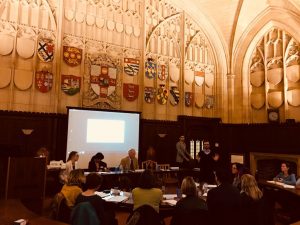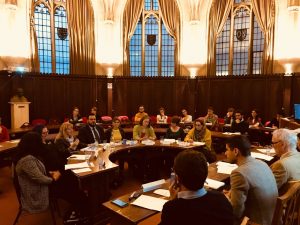The United Nations and networking are an unlikely pairing for a CRE blog entry, but my recent meeting with Professor Alston from the United Nations came about because of network contacts I had made earlier.
Post-graduate research can be a lonely business and students can feel that others are not especially interested in their work. This is clearly a case of faulty thinking but can be seriously demotivating and demoralising, and one of my strategies for managing it has been to develop networks with others working on related issues. On one of my frequent internet trawls to find these people (who must surely be out there?), I came across Lydia Medland [1], a PhD student at Bristol University whose research is about seasonal agricultural workers in Morocco and Spain. The obvious similarities between our research interests means we can commiserate about the research obstacles and challenges we have in common and constructively debate what we’re doing and what we think we’ve found.
But to return to the United Nations bit of this blog’s title, Lydia was instrumental in my invitation to present evidence about rural poverty to Professor Philip Alston, the United Nations’ Special Rapporteur (SR) on extreme poverty and human rights. Professor Alston carried out a fact-finding visit to the UK in November 2018 to investigate government policy and actions around UK poverty and to determine whether the government is fulfilling its international human rights law obligations.

Dr Tomaso Ferrando presents to Professor Alston Credit: Dr Tomaso Ferrando
Lydia’s local network includes Dr Tomaso Ferrando [2], a lecturer at the Bristol Law School, who was tasked with hosting one of many sessions held across the UK for various individuals, communities and institutions to present evidence to Professor Alston. Dr Ferrando wanted someone working with UK farmworkers to contribute to the session to be held at the Bristol Law School, which was specifically about rural poverty, and this led to me being invited.
Initially I wasn’t sure I could make a valid contribution. My research participants are not representative of most rural residents in poverty, because they are highly transient. However, I was assured that the complexities of rural poverty needed to be illustrated, and that the EU nationalities of my research participants would highlight the additional spanner in the works that Brexit might bring. In addition, the SR had by this stage identified thematic areas of interest including Brexit, austerity and digitalization as well as rural poverty more generally, making my own research seem rather more relevant.

Members of the UN expert panel present to Professor Alston Credit: Dr Tomaso Ferrando
The United Nations expert panel meeting was held in the Wills Memorial Building, a Grade 2 listed Gothic style building, built in the early 1900s by a family of tobacco merchants. It houses the School of Law and the Department of Earth Sciences and is used for degree ceremonies and examinations. The panel meeting took place in a room as impressive as the building’s exterior, but which also felt as formal as a courtroom. Eight people including representatives of foodbanks formed the panel and a small number of students and academics attended as a ‘silent audience’. We each had a few minutes to introduce ourselves and our work, and make brief points about our understanding of rural poverty in relation to the SRs thematic areas of interest. This was followed by a question and answer session, after which Professor Alston flew to Newcastle for his next fact-finding meeting. The whole event, which was strictly scheduled by Dr Ferrando and the two UN staff accompanying Professor Alston, lasted less than an hour which meant our contributions had to be brief and focused. However, we were also invited to submit written summaries of the points we wished to raise about rural poverty, and those I highlighted included the following:
Seasonal farmworkers:
- Often have extremely limited access to shops, healthcare and public services. Farms’ rural locations can make mobile phone reception and internet access unreliable, so regular contact with friends and family at home, arranging homeward travel, looking for other work and transferring money becomes difficult.
- Prefer farms where they are known as an individual by their employer. This increased the likelihood of them being ‘looked after’ which helps reduce the sense of precarity inherent in seasonal farmwork.
- Sometimes work whilst ill or in pain. Their commitment to sending money back to their families at home discourages them from spending money on prescriptions and dental care whilst in the UK, or from taking time off work to seek healthcare.
- Prefer farms where the practicalities of their lives are considered, including having the use of a minibus which means workers can socialise off the farm, shop, attend church and access healthcare autonomously.
- Sometimes have inadequate bathroom, kitchen and sleeping facilities. This is often related to cost savings on a farm being prioritized over workers’ comfort and wellbeing.
- Feel their wellbeing is compromised when their personal identity becomes obscured by their economic value. This makes them less likely to return to that farm to work.
In summary, being given the chance to contribute to the United Nations inquiry into poverty in the UK arose from the willingness of people to connect with others in the research community. Contributing to this event was a valuable and enlightening experience in itself, but one which also served as a reminder that poverty is not simply about lack of money, and that poverty in rural areas can be especially challenging. My visit to Bristol also provided an opportunity to meet with and make further connections with new contacts who have expertise relating to my own research interests.
Find out more about Professor Alston’s inquiry, including a very enlightening video clip, here.
[1] Lydia Medland is an ESRC funded student on the Global Political Economy interdisciplinary PhD programme. http://www.bristol.ac.uk/spais/people/person/lydia-k-medland/
[2] Dr Ferrando’s work is concerned with the links between food and law, especially around international trade, investment and rights to food.
